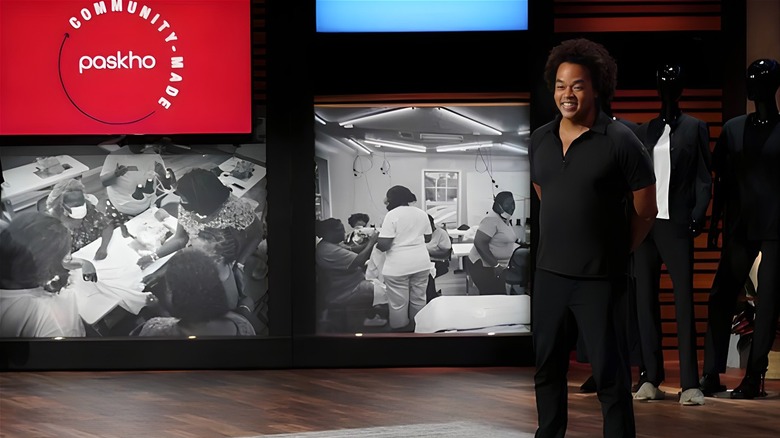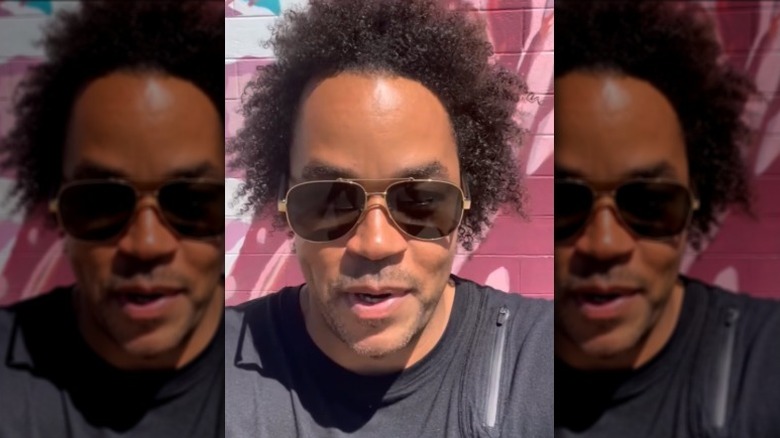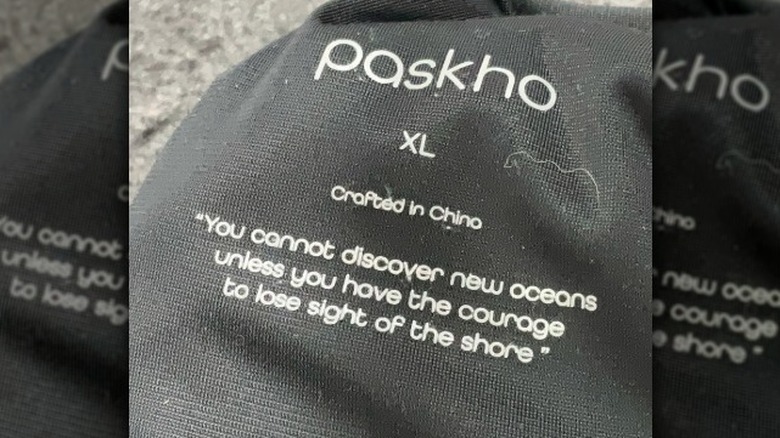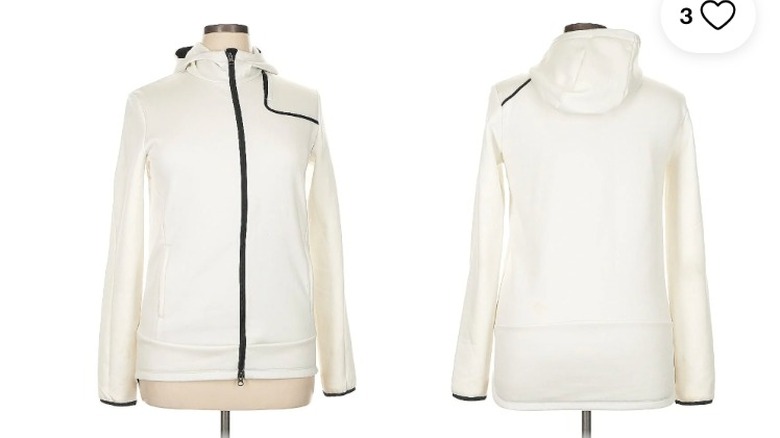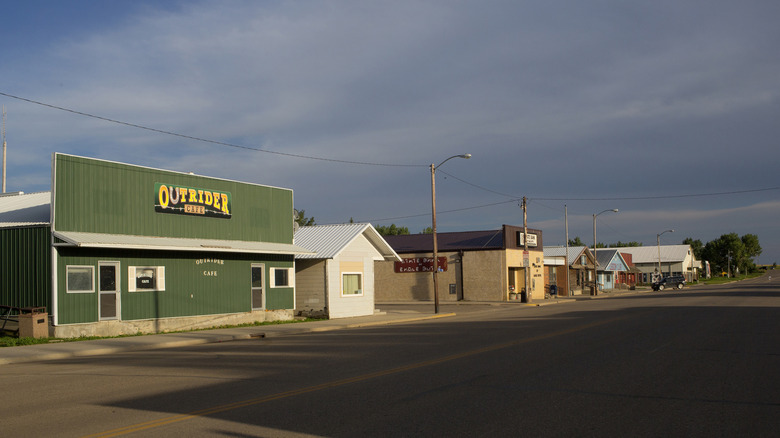Here's What Went Down With Paskho After Shark Tank
You might remember Paskho as the eco-friendly apparel brand that appeared in Season 13 of Shark Tank. The brand's aesthetic focus was (and still is) on creating high-quality and comfortable travel clothing in sustainable ways. However, the company's dedication to overcoming racial and social inequality through job creation and living wage standards is what makes the brand truly special. Ultimately, Paskho is less about its actual clothing and more about its company's social mission.
Paskho was founded by Patrick Robinson, a veteran fashion designer whose career has included working for fashion houses like Giorgio Armani, Anne Klein, Perry Ellis, Paco Rabanne, and Gap. After working in multiple different levels of fashion, Robinson noticed inequities to which he couldn't continue contributing. In response, he launched the Paskho Community-Made Initiative as a way to do more for struggling communities while also designing high-quality products.
As of 2025, Paskho is focused on not only moving away from the dangers of fast fashion but also on revitalizing American manufacturing by allowing makers in the US to make Paskho's products. Robinson argues that, by bringing 100% of Paskho's manufacturing back to the US, they can create jobs in underserved communities and combat social injustice. Not bad for a pair of chic travel pants. This brought Robinson to Shark Tank, where he presented his vision with the hopes of getting a $500,000 investment.
What happened to Paskho on Shark Tank?
Despite Robinson's illustrious career and outstanding social messaging. none of the investors on Shark Tank chose to invest in Paskho during the episode (which aired in October 2021). Despite this, Robinson's dedication to not only environmental sustainability but also social equality impressed the Sharks. It's worth noting that Paskho's creation in 2015 was due to a successful Kickstarter that didn't have nearly the focus on social equality that it does now. However, the death of George Floyd in May 2020 spurned Robinson's expanded vision for the brand.
In order to continue expanding his production location and abilities, he asked the Sharks for a $500,000 investment in exchange for a 2.5% stake in his company. While most of the Sharks emphasized their lack of expertise in the apparel and fashion markets, the high cost of production was ultimately seen as a negative. Even though Robinson told the Sharks that the company's 2019 sales came to $6.7 million, the problem came down to a lack of overall profitability due to both supply chain issues and a very high customer acquisition cost ($95 per a single pair of pants, to be exact).
The Sharks argued that Robinson had a marketing problem, with an inability to reach customers through his brand. This lack of greater customer acquisition, combined with the fact the company wasn't yet profitable, led each of the Sharks to decline Robinson's pitch and Robinson left the show with no investment deals.
Paskho After Shark Tank
Despite the Sharks claiming that Robinson had a marketing problem, fans of the show were impressed by Paskho. Many even fought back on social media against some of the criticism that the Sharks threw at Robinson's idea, showing how supportive people were of Robinson's vision to help end the racial wealth gap affecting underserved communities. All press was good press in this instance.
Paskho had been previously received an investment from a non-profit organization, Souls Grown Deep, in early 2021. Their $600,000 went towards the establishment of a localized production pod in an impoverished area in Boykin, Alabama known as Gee's Bend. This production pod led to the training of seamstresses and quilters in the area, who now make Paskho clothing while earning a living wage. While the initial investment pre-dates Robinson's time on Shark Tank, the process of developing this manufacturing pod took over a year to fully complete. This pod's successful implementation helped Paskho continue its journey of moving manufacturing to the U.S., and even allowed the brand to work on production pods in other places.
In keeping with Robinson's attempts to change the fashion world, Paskho's community-made clothing line allowed the brand to put its mission up front when selling its clothing. The brand also introduced pre-ordered, crowd-funded items intended to minimize additional waste. The crowd-funded studio allowed consumers to support Paskho's community-made endeavors while also promoting sustainability.
As of 2025, Paskho appears to no longer be an active business
Unfortunately, after years of creating travel wear, Paskho appears to no longer be an active business. According to LinkedIn, as of 2025, most of the company's personnel have moved on to other companies and roles. Robinson's LinkedIn profile, however, lists him as the current CEO of Paskho, with no new roles listed. At the time of writing, it remains unclear what happened to the business. The brand's final social media post on X, formerly known as Twitter, was in 2022, and focused primarily on voting in the U.S. 2024 election and the importance of supporting reproductive rights. At the time of writing, the brand's official website remains inactive, with no announcement in the press indicating a closure. The company's Instagram has entirely disappeared.
Previously, Robinson had been very transparent on the Paskho social media accounts that the journey had not been easy, noting that the company still struggled to fulfill its mission and change people's minds about clothing (while also embracing slow fashion). However, it remains unclear exactly what prompted the website to disappear from the internet. Given the financials presented on the show about its sales between 2019 and 2020, the company was estimated to be worth around $5 million. Robinson also told WWD in 2019 that many of its customers would purchase something between four and seven times a year, indicating they had built a loyal consumer base.
Paskho's workers have moved on
In 2023, Paskho had been developing a brand new production pod on the Cheyenne River Reservation in South Dakota. Dubbed the "Oyate" Pod by the community there (Oyate is the Lakota word for "people"), this pod marks a new home for Paskho in South Dakota. Much like Gee's Bend before it, the hope was the production pod would bring manufacturing and sewing jobs directly to an impoverished area. By training a sewing pod of six people at a time, Paskho ensured their makers learned from a master sewing professional and were given time to develop their seamstress skills.
"My long-term goal is a big one. My long-term goal is to actually be able to manufacture not just clothes, but multiple products in communities across the United States," Robinson told Alabama News Center in 2022. In March 2023, the Oyate pod employed six makers, and was looking to grow with the addition of 12 more sewers in two additional pods. However, as of 2025, it appears that Oyate has transformed into a communal co-work space. It remains unclear if Paskho or Robinson is still associated with the community.
